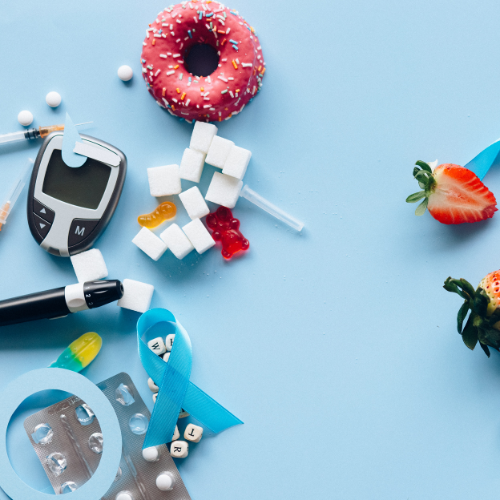
Type 2 diabetes: fish oil or the combination of echium and borage oil to reduce cholesterol

Supplementation with fish oil supplements, in patients with early stage type 2 diabetes or metabolicsyndrome , is associated with improved cholesterol levels. Positive effects also appear to be obtained by taking a combination of borage oil and echium oil.
This is what researchers at Wake Forest School of Medicine, North Carolina (USA), discovered and published in recent months in the journal Lipids in Health and Disease.
Can omega-3s influence type 2 diabetes?
The increasing prevalence of obesity is strongly associated with systemic inflammation, dyslipidemia, insulin resistance, and diabetes. Lifestyle, and particularly diet, play a key role in the development and progression of type 2 diabetes, the most prevalent form of the disease. Consumption of fatty fish, which is rich in omega-3 fatty acids such as EPA (eicosapentaenoic acid) and DHA (docosahexaenoic acid), has several beneficial health effects; they appear effective in reducing the risk of cardiovascular disease. Based on these observations, it has been hypothesized that Omega-3 may also have positive effects in patients with type 2 diabetes. However, some recent meta-analysis and prospective studies have revealed insignificant results, and randomized clinical trials focusing on the effects of Omega-3s on diabetes are still very lacking.
Less cholesterol after 8 weeks of supplementation
Scientists recruited 59 subjects with early-stage type-2 diabetes or metabolic syndrome. The participants were randomly divided into three groups, and took daily supplements. The first group, the control group, received corn oil, the second group received a combination of borage (Borago officinalis L.) and echium (Echium plantagineum L.) oil, and the final group received fish oil supplements (containing 6 grams of EPA + DHA). After eight weeks, results of specific analyses showed that the combination of borage oil and echium was associated with decreases in total cholesterol (from 182.0 to 171.9 mg/dL) and LDL "bad" cholesterol (from 106.3 to 96.8 mg/dL). The group that had taken fish oil also showed significant increases in HDL cholesterol, the so-called good cholesterol (from 40.7 mg/dL to 43.6 mg/dL), and decreases in triglycerides from 1872 to 56.8 mg/dL. In addition, subjects who had taken fish oil showed a significant reduction in hemoglobin A1c levels an indicator of excess blood glucose.
Fish oil and botanical oils improve inflammatory status
As commented by the researchers who designed it, this study showed that short-term supplementation with borage and echium oil and fish oil, reduced the presence of markers associated with type 2 diabetes and metabolic syndrome. Commenting independently on the results of the study, Harry Rice, vice president of regulatory and scientific affairs for the Global Organization for EPA and DHA (GOED), confirmed that the most interesting result was that HDL cholesterol levels in subjects who had taken the fish oil, but not those who had received the others, had increased after only four weeks. High HDL levels, in fact, reduce the risk of heart disease, while low levels increase it. Further studies with longer treatments and more subjects involved will be needed to better understand the degree to which supplements may impact dyslipidemia, 'inflammation and glucose levels, in patients with diabetes and metabolic syndrome.
Source:
T.C. Lee, P. Ivester, A.G. Hester, S. Sergeant, L.D. Case, T. Morgan, E.O. Kouba, F.H. Chilton. "The impact of polyunsaturated fatty acid-based dietary supplements on disease biomarkers in a metabolic syndrome/diabetes population." Lipids in Health and DiseaseDecember 2014, 13:196, doi:10.1186/1476-511X-13-196.
Recommended products
OMEGOR Vitality 1000 - 90 capsules
Just 3 words: power, freshness, purity. And always 5 stars. OMEGOR® Vitality is a concentrate of Omega-3 rated by IFOS (International Fish Oil Standards), the best-known quality certification in the field of Omega-3 supplements, consistently scoring top marks since it was first marketed in 2005. It is the top of the range.
Serving size : 1-4 capsules
Number of servings: 22-90
Lotand expiration date: 251602-May 2028
OMEGOR Twinefa
What do intense sports and PMS have in common? Apparently nothing, yet upon closer inspection there is a shared need: the right balance of essential fatty acids. To address this need, we created OMEGOR® Twinefa, with Omega-3 EPA and DHA in triglyceride form (the most easily absorbed) from fish oil ultrapurified, with the addition of valuable GLA from borage oil.
Servingsize: 2-6
Number of servings: 10-30
Lotand expiration date: 6040669 - June 2027
OMEGOR Antiage
Nature gave us antioxidants, science has discovered how to make them work together. And we have brought them together in a single product capable of fighting premature aging: OMEGOR® Antiage, which brings together all the most valuable and effective natural antioxidants, such as Omega-3 EPA and DHA, Omega-6 GLA, resveratrol, turmeric, lipoic acid, coenzyme Q10, tocotrienols and tocopherols.
Serving size: 2 capsules per day
Number of servings: 30
Lot and expiration date: 244607-November 2027








